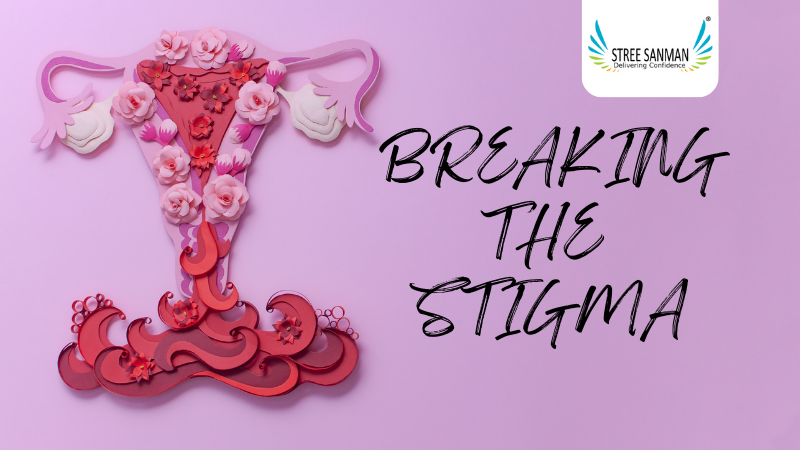Breaking the Taboo: Exploring Menstrual Stigma and Approaches to Normalizing Discussions on Menstruation
Unfortunately, stigma and taboo have shrouded menstruation, a natural biological process experienced by billions of people worldwide, for centuries. Similarly, the shame and silence surrounding menstruation perpetuate inequalities and contribute to period poverty. In this blog post, we delve into the detrimental effects of menstrual stigma, explore its link to period poverty, and discuss strategies to break the silence and normalize conversations about periods.
Understanding Menstrual Stigma:
Menstrual stigma refers to the negative societal attitudes and beliefs surrounding menstruation. This stigma is rooted in cultural, religious, and social norms that perpetuate myths, stereotypes, and misconceptions about menstruating individuals. Menstrual taboos often lead to discrimination, shame, and limited access to resources, exacerbating period poverty.
The Link between Stigma and Period Poverty:
Menstrual stigma and period poverty are intricately connected. In addition to, in societies where menstruation is stigmatized, individuals face barriers to accessing affordable and hygienic menstrual products, adequate sanitation facilities, and comprehensive menstrual health education. Meanwhile, the shame and silence surrounding periods prevent open conversations, perpetuate gender inequality, and hinder efforts to address period poverty effectively.
Effects of Stigma on Mental and Physical Health:
The impact of menstrual stigma extends beyond the social realm, affecting mental and physical health. However, studies have shown that shame and secrecy surrounding menstruation contribute to anxiety, depression, and low self-esteem among menstruating individuals. Moreover, inadequate access to menstrual hygiene products can lead to unhygienic practices, increasing the risk of infections and health complications.
Relevant Statistics (Sources:)
- On the other hand, according to UNESCO, 1 in 10 girls in Sub-Saharan Africa misses school during menstruation, which amounts to approximately 20% of their school year.
- Likewise, the Water Supply and Sanitation Collaborative Council estimates that globally, over 500 million women and girls lack adequate facilities for menstrual hygiene management.
- Ultimately, plan International reports that in some cultures, menstruating individuals are considered “unclean,” leading to social exclusion, restrictions on daily activities, and limited educational opportunities.
Strategies for Normalizing Conversations about Periods:
Furthermore, to break the stigma surrounding menstruation and combat period poverty, we need to foster an open dialogue and promote comprehensive menstrual health education. Here are some strategies for normalizing conversations about periods in brief:
- Education and Awareness:
- Integrate menstrual health education into school curricula, providing accurate information and debunking myths.
- Conduct awareness campaigns targeting communities, parents, and educators to promote understanding and acceptance.
- Inclusive Language and Culture:
- Encourage the use of inclusive language that promotes dignity and respect when discussing menstruation.
- Challenge cultural and religious taboos through community engagement and dialogue.
- Advocacy and Policy Changes:
- Advocate for policy changes that ensure access to affordable menstrual products, adequate sanitation facilities, and menstrual leave policies.
- Engage with policymakers to address menstrual health as a human right and an essential aspect of gender equality.
- Empowering Menstruating Individuals:
- In essence to, Support initiatives that provide affordable, sustainable menstrual products to underserved communities.
- Foster support networks and safe spaces where individuals can openly discuss their experiences and share resources.
- Installation of Sanitary Napkin Vending Machines:
- Install sanitary napkin vending machines in public spaces, schools, and workplaces to provide convenient and discreet access to menstrual products.
- Promote the use of vending machines as a means to overcome the barriers of affordability and accessibility.
- Also read:WHY TO INSTALL SANITARY NAPKIN VENDING MACHINE IN MALLS?UTILITY OF INSTALLING SANITARY NAPKIN VENDING MACHINE AND INCINERATORS IN EACH SOCIETY.
Conclusion:
In conclusion, thus breaking the stigma surrounding menstruation is crucial for addressing period poverty and promoting menstrual equity. By challenging taboos, providing comprehensive education, and advocating for policy changes, we can create an inclusive society where menstruating individuals can access the resources and support they need. As a result, Let’s break the silence, normalize conversations about periods, and work together towards a more equitable future for all.

 Sanitary napkin Vending Machine
Sanitary napkin Vending Machine Eco-friendly Waste Treatment
Eco-friendly Waste Treatment Outdoor Air purifier
Outdoor Air purifier